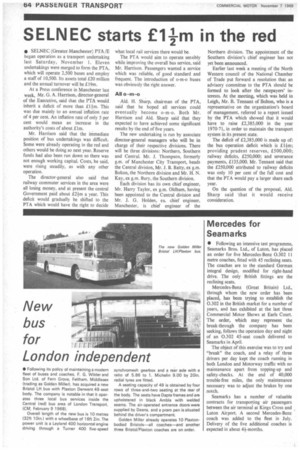SELNEC starts film in the red
Page 66

If you've noticed an error in this article please click here to report it so we can fix it.
• SELNEC (Greater Manchester) PTA /E began operation as a transport undertaking last Saturday, November 1. Eleven undertakings were merged to form the PTA, which will operate 2,500 buses and employ a staff of 10,500. Its assets total £20 million and the annual turnover will be £19m.
At a Press conference in Manchester last week, Mr. G. A. Harrison, director-general of the Executive, said that the PTA would inherit a deficit of more than £1 tti. This was due mainly to an annual inflation rate of 4 per cent. An inflation rate of only 5 per cent would mean an increase in the authority's costs of about £lm.
Mr. Harrison said that the immediate position of bus undertakings was difficult. Some were already operating in the red and others would be doing so next year. Reserve funds had also been run down so there was not enough working capital. Costs, he said, were rising steadily, as with any other operation.
The director-general also said that railway commuter services in the area were all losing money, and at present the central Government paid about f2fm a year. This deficit would gradually be shifted to the PTA which would have the right to decide what local rail services there would be.
The PTA would aim to operate sensibly while improving the overall bus service, said Mr. Harrison. Passengers wanted a service which was reliable, of good standard and frequent. The introduction of o-m-o buses was obviously the right answer.
All o-m-o Aid. H. Sharp, chairman of the PTA, said that he hoped all services could eventually become o-m-o. Both Mr. Harrison and Aid. Sharp said that they expected to have achieved some significant results by the end of five years.
The new undertaking is run by associate director-general managers who will be in charge of their respective divisions. There will be three divisions: Northern, Southern and Central. Mr. 1. Thompson, formerly g.m. of Manchester City Transport, heads the Central division, Mr. J. B. Batty, ex g.m. Bolton, the Northern division and Mr. H. N. Kay, ex g.m. Bury, the Southern division.
Each division has its own chief engineer, Mr. Harry Taylor, ex g.m. Oldham, having been appointed to the Central division and Mr. J. G. Holden, ex. chief engineer, Manchester, is chief engineer of the Northern division. The appointment of the Southern division's chief engineer has not yet been announced.
Earlier last week a meeting of the North Western council of the National Chamber of Trade put forward a resolution that an advisory committee to the PTA should be formed to look after the ratepayers' interests. At the meeting, which was held in Leigh, Mr. B. Tennant of Bolton, who is a representative on the organization's board of management, referred to a report issued by the PTA which showed that it would have to raise £2,385,000 in the year 1970-71, in order to maintain the transport system in its present state.
The deficit of £2,385,000 is made up of: the bus operation deficit which is £14-m; providing prudent reserves, £500,000; railway deficits, 1250,000; and severance payments, /135,000. Mr. Tennant said that the £250,000 attributed to railway deficits was only 10 per cent of the full cost and that the PTA would pay a larger share each year.
On the question of the proposal, Aid. Sharp said that it would receive consideration.




































































































































































































































